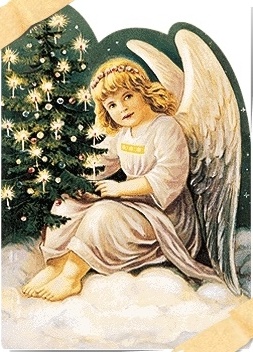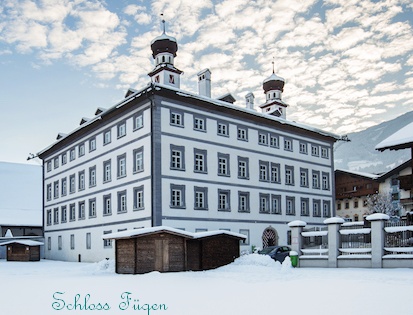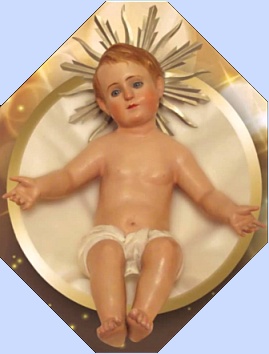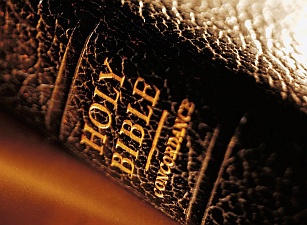
Silent night - a philosophical reflection
|
First of all, we should stipulate that "Silent Night, Holy Night" is an Austrian song. I'll come back to that later. But it is probably no more than right that we hear an Austrian singing the original version at the beginning, isn't it?
|
I have a special relationship to this song. I was affected by it as a child. We were not a particularly religious family, but on Christmas Eve Silent Night and Oh Tannenbaum were sung before there were any gifts. Those lay in nice packages under the tree. The focus of us children was probably on them, rather than on the Christmas carols. Nevertheless, the latter made a lasting impression on me, especially the Silent Night.
|
 |
Perhaps this is connected with the Austrian tradition on Christmas Eve. There are no decorated Christmas trees already at the beginning of December, no, they are only made beautiful on Christmas Eve, and in the absence of the children. It was probably not so easy for my mother to keep prying eyes away, because we only had a room-kitchen apartment. By the way, we were very happy to live there, because after the war there were still many people who were forced to staying with strangers in sublet. This had been the case with us for a while, but I assume that we were preferred, because there were small children in the family. I still remember today the feeling of coming to an "own" rented apartment - the pride with which I put the small bag with my toys in a corner of the room, which then became a living room, bedroom and children's room in combination.
|
|
Pieces of cardboard had been put into the glassless window frames, so that the wind should not blow through the whole apartment. Anyhow, we could cook and eat in the small kitchen. Of course, there was no facility at all in these perhaps thirty square meters, but we were very lucky, that there were electricity and gas connections. Everything else had to be bought by yourself over time. We had to get water half a floor lower and we had to share the toilet in the stairwell together with the neighbours. There was only one neighbouring apartment, because the other one was in the bombed part of the house. It is admirable beyond all limits that only in a few years my mother managed to create a simple, but still cozy home from this mess.
You may be wondering what all this has to do with Christmas. I will explain it soon, but I think that we will first listen to a Swedish version of the "Stilla Natt".
|
|
But now back to tradition. Of course, we children knew that it would soon be Christmas and of course there would also be a gift, even if it was just a pair of knitted socks. Some little toy was always there. But now the expectation had been built up and it increased on Christmas Eve, when the day never wanted to pass. Now the Christ Child would come with the tree and the gifts. The Christ Child came through the window as an angel, so that you never got to see it. For when it had set up the tree and placed the presents under it, it rang with a little bell, which also hung in the tree, and which was considered a sign that it was finished and then flew away again. At last we were allowed to open the door and freeze with joy at the sight. It was dark in the room, only the candles in the fir tree shone, perhaps together with a star spucker. The whole Christmas was built on this single, overwhelming moment. Therefore, it is perhaps not so surprising that I associated the Silent Night with these moments.
I experienced one of the biggest culture shocks when I came to Sweden and only heard funny children's songs here, where the gnomes filled the glasses and the foxes ran over the ice ...
|
 |
|
At my home, however, my tradition was continued - my spouses had to accept that. (No, I was not a bigamist, one came after the other, or - rather - vice versa.)
As I said, I will come back to the Silent Night. Let me just add that I believe it is the song with the biggest international distribution ever. I have searched the internet and the result is fascinating. The melody is available in all imaginable countries. Unfortunately, I do not know in most cases how much the text corresponds to the original in those different languages. In any case, here comes a Slovenian version with the title "Sveta Noč, Blažena Noč", which surely is very close to the original.
|
|
My children also had to put up with it, even when they already were teenagers. I understand that they were also influenced by the surrounding society and that they found it a little ridiculous to have to sit in their room, so that they did not see the tree ahead of time. But tradition is tradition, at least as long as they lived with me. Then, when they had families of their own, none of them continued the tradition. I think it is a pity, because it is still a part of their cultural heritage - but you have to accept such things when you live abroad. Nowadays we don't meet each other on Christmas Eve anymore, but that is probably mostly my own choice. I would hopefully be able to come to one of the children if I asked them, but I wouldn't experience the same Christmas atmosphere. We definitely see each other at the following holidays, so I can spend Christmas Eve in my own way. I, too, have adapted. I now have a small tree made of plastic, but otherwise I follow my routine, even when I'm alone. When it starts to get dark, I take the "fir tree" out of the storage room and look for the balls and the tinsel. But before I start decorating the tree, I put on better clothes than I usually wear at home.
|
|
Then I try to find a station on the radio that plays Christmas carols to get in the mood. Another possibility is, that I play my own songs, that I have on the computer. But that is not the same, because I know what is coming next. This is not a real live feeling. And then, as a final preparation, I allow myself a sip of whiskey that does not hide in the glass. After that the turn has come to the tree and when everything is ready, I turn off the light and sing Silent Night. I guess I am an anachronism in our hectic age, but that is the way it has to be. A while of quiet tranquility must be on Christmas Eve.
But it is time for another version of the song. Here comes "Oiche Chiúin", which is Irish and means "Silent Night, Night of the Son of God".
|
 |
But now for a few facts: Joseph Mohr was a young vicar in Mariapfarr, in the province of Salzburg. There, in 1816, he wrote a poem, which he called "Silent Night". At the Congress in Vienna, 1814/15, after the Napoleonic Wars, it was decided that the area around Salzburg henceforth should go to the Habsburg Empire. Before it had been an episcopel property. But in 1816 it was already a part of Austria. When Joseph Mohr came to Oberndorf, he met Franz Gruber, who was a teacher in the neighbouring village of Arnsdorf and was also appointed organist by the surrounding villages. He, too, was young, and apparently Mohr and Gruber found each other, because the assistant pastor asked the organist to set his poem to music.
The work actually had six stanzas, but today usually one sings only three of them, which are the first, second and sixth. The song had its premiere on Christmas Eve 1818 in the church of St. Nikola in Oberndorf, when Mohr and Gruber performed it to guitar accompaniment. The reason for this is said to have been that mice had nibbled at the air supply of the organ, so that it did not work. But this is not officially proven. On the other hand, it is known that the organ builder Karl Mauracher had a major part in the distribution of the song. He heard it when he was repairing the organ in St. Nikola. He liked it and took it with him to Fügen in Tyrol, where he lived.
|
 |
The following year, Silent Night was also sung in Fügen at Christmas time. Another three years later, Austria's Emperor Franz I, met with the Russian Tsar Alexander I at the Castle of Fügen. They also heard the song. In 1833 it was printed for the first time, but then as a "Tyrolean song". Only fifteen years later they had forgotten about Mohr and Gruber and assumed it was a folk song. We owe it to the research of King Friedrich Wilhelm of Prussia that the authors were found again.
On the other hand, most people in the USA today believe that "Silent Night" is an American folk song ...
|
|
It is a little unfair that the English version, seen internationally, gets the whole reputation, because in principle "Silent Night" is sung everywhere instead of "Stille Nacht". The only lucky thing is that the song (according to Wikipedia) has been translated into more than three hundred different languages. On the other hand, this is quite all right, because in this way you can contribute a little bit to international understanding - and there can never be enough occasions for that.
My uncle was a prisoner of war in Russia, and he told that someone in the camp began to sing Silent Night on Christmas Eve. Soon after, everyone sang along, even the guards. Everyone sang in their own language. You can almost feel the cold running down your back when you imagine the situation.
Ivan Rebroff now sings in Russian and gives us "Oh Tannenbaum" as a bonus.
|
When you do some research, as I did in this case, you always learn things that you had no idea about. I studied linguistics a long time ago, so I noticed that "night" must be an ancient, Indo-European word. In all Germanic, Latin and Slavic languages that I know, the word begins with "n" and ends with a "t", usually together with a hissing or breathy sound. This can be before, as in the German or Dutch "nacht" and in the Greek "nichta", or afterwards, as in the Spanish "noche" (ch = tsch), in the Slovenian "noč", in the Czech and Polish "noc" or in the Russian "notsch".
Here I now have to use reference books to help me and I learn that the word "naht" goes back to early Old Germanic, and still longer back it occurs in history as "nokt" in Indo-European and even as "nakti" in Sanskrit.
Also, I am learning that in Old Germanic it are not the days that have been counted, but the nights. A remnant of this is the English "fortnight", which indicates a period of fourteen days ("fort" is an abbreviation of fourteen). With today's hotel prices, you are considering whether you should not return to the night calculation, so that you can see more quickly how long you can afford a stay.
We are going to look at another version that has emerged from an Indo-European language. It is the Spanish "Noche de paz", which means "Night of Peace".
|
As a linguist, you are also aware that there is a language group between the Germanic and Slavic languages that has its origin not in Indo-European. These languages are in a line from north to south and include Finnish, Estonian and Hungarian. You can also find similarities here quite correctly, even if you do not know these languages. The Finnish sing of the Christmas night joulu"yö", while the Estonian night is called "öö". From here it is a bit further to the Hungarian "éj", but in all three languages the word has only two letters and consists (almost) only of vowels. Sami and Karelian also belong to the Finno-Ugric language group, along with some of the languages spoken in the Urals (in the middle of Russia), such as Komi, Mansi, Mari and others.
The three Baltic countries are often treated as a single entity, but this does not apply to their languages. In the Latvian "nakts" and in Lithuania's "nakti" we see quite clearly that they differ from the Estonian by their Indo-European heritage. Let's join an Estonian Silent Night now: Püha öö
|
 |
I try to listen to the texts, even if I can't speak the language. You can single out individual words, at least if you know what it is about. You can usually quite easily understand names like "Mary, Jesus, Christ" and more often like "Hallelujah". In this way, you can at least make sure that the content is approximately the same as the original text.
Maltese is an interesting language. It is originally Arabic, but there is a huge Italian influence. Accordingly Italian was an official language in Malta until 1964, when the island itself became independent. A full 52 percent of the vocabulary comes from Italian. Today English is an official language apart from Maltese. "Lejl ta' skiet" - the title means Silent Night - is available on a CD, which is called "Helu Bambin". Bambin comes naturally from the Italian "bambino" and "helu" means "sweet", according to my dictionary. The sweet child is of course Jesus. And now I guess: could it be that "helu" is of English origin and descended from "holy"? Anyway - here comes Silent Night in Maltese:
|
If you write such an article, then you have enough time to let your thoughts run free while listening to the music. One question, that came into my mind, was the difference between faith and religion. Is there a faith without religion? Is there a religion without faith? Perhaps I should first define the terms: faith is an imagination of a great power, an initial force - whether that is the sun or a god or something else. And that is why I think that one has to answer the question with yes, if there is a faith without religion. Every person, who has ever lived, has had the opportunity to represent his own faith, even if he had grown up far from any community.
Religion, on the contrary, is the "code of laws" of faith, which prescribes what to believe in, what rules apply in life, and so on. The question of whether there is a religion without faith is absurd. Because even if it were possible in principle, some charlatan, shaman, priest or church would soon try to put pressure on the believers in order to control them. As an answer to the chicken-or-egg question, it is only logical that faith must come first. And of course you can believe without believing in a religion.
I wonder what the Eskimos have faith in, if they have not been proselytized by Christianity. Because that certainly has happened. Here is Silent Night in Inuktitut, that is, in the language of the Inuits, as the Eskimos are actually called. "Unnuaq Upinnaq":
|
Speaking of proselytizing, it is unfortunately not enough to say that it was a Christian community that converted many people to the "right" faith. Were they Orthodox missionaries, or Catholic, did they come from one of the Protestant faiths, or perhaps from a self-made, independent, Christian religion? How did this affect the texttranslation of Silent Night?
Not at all, you say? I'm not so sure about that. I can speak too few languages to form an opinion on this, but I know that there is a Catholic and a Protestant version of the song in the Netherlands. Isn't that actually quite frightening?
It is just as terrible when you think of all the misdeeds that have resulted from these fragmentation. The entire Thirty years' war was the result of a question of faith. Forced baptisms and country expulsions were frequent occurrences. But already a few decades before, the hostility prevailed in France, culminating in the Bartholomew's Night, on August 24, 1572. Then one of the bloodiest acts ever happened, when several thousand Huguenots were murdered. Huguenots were adherents of Calvin's Protestant doctrine. But we do not need to go back in history, it is enough if we turn our attention to Northern Ireland, where Protestants and Catholics still are not very positive towards each other. And both refer to the same God. Whose side is he on?
Most of us surely long for peace to reign - not only on Holy Night... An Indian version, sung in Arapaho, may remind us of the bloody subjugation of the Indians, to whom Pizarro, Cortes and many others were guilty.
|
I have written about the crime of Christianity against humanity, where the Inquisition also persecuted its own people and not only dissenters. But I would add that this is only because I don't know enough about the history of other religions. There are certainly similar crimes in most of them. Just look at the fragmentation of Islam in Sunni and Shia and the strife between them, not to mention the reckless terrorist attacks around the world. Just look at the most terrible crimes that Judaism is guilty of in Israel, against its neighbours and, above all, against the Palestinians. And I very much suspect that in Hinduism, Buddhism, Shintoism, or whatever they are called, happens exactly the same thing.
But the Arabic also has a version of Silent Night, which fits here, doesn't it? It is a little difficult to translate the title because the language is so different. The word "song text" should be translated as "A poem with verses to sing". Here it follows in any case:
|
|
Have I found enough faults about religion now? Let me turn the tables and say that religions are great cultural mediators. Especially at a time when most people could neither write nor read, they were important. Just think of the library in the Vatican (which you can't visit anyway), but also think of the work in the monasteries.
|
They copied uncountable texts and books, writings that probably would not have been preserved for us today. Just think of all the art that is kept in holy places and also think of the buildings themselves. And finally, think of the sacred writings of the religions, which not only consist of rules of life, but also where there is a traditional description of history, such as in the Old Testament. How much of this really is true remains another question. But I do believe that the broad outlines are somewhat right. Science has shown that Jesus really lived. The accounts of the flood are spread in many religions all over the world, which is also a sign that it really happened.
|
 |
If you are interested in other theories, for example those presented by Erich von Däniken, you can read about the prophet Ezekiel and decide for yourself whether it is just an invention, what he describes. Or if maybe he really was taken off in a "sky wagon". Here on the right is the painting of Ezekiel, which Michelangelo created in Rome, in the Sistine Chapel.
Naturally, one should not believe everything literally, as it is written, for example, in the Bible. Of course, the texts have been changed, sometimes by chance, sometimes on purpose, when the texts have been translated or copied.
I'm not saying that you have to read the Bible from side to side just because you live in a Christian country. But I think that it is part of general education that you at least roughly know the plots, that are in it. Adam and Eve, Moses and the life of Christ - this is probably a minimum of knowledge that each of us should have. Unfortunately, it is not so. The protagonists in "Star Wars" and the hit titles of the favorite are far more interesting. Don't get me wrong, it is not a mistake to know these, after all even this is culture.
|
 |
|
But I think that this is a part of the culture that weighs much lighter and that will not survive the passage of time as long as other cultural history, which is already a few thousand years old. But I do not judge, everyone may become happy in their own way ...
In the end, however, the Silent Night is also cultural history, which already has lived for two hundred years - and which probably has a greater spread than Christianity itself. What do you think of a Japanese version? "Kiyoshi kono yoru".
|
|
I must confess that I was very amazed when I found the song on the Internet in so many languages. Many of them are performed quite traditionally, even if one or the other version may sound a bit peculiar. And it is a little surprising that there is Silent Night even in Swahili. But this is true ...
|
As for the different languages, I learned from the existence of some which I really did not know anything about. As the linguist I should be, I should have known that Kashubian is a language spoken in the border areas of Germany and Poland. And even more so because the song is titled "Cëchò noc" and therefore clearly points to Slavic origin. But I had certainly not heard of Chamorro yet. Now I know that it is about the people and the language on the Mariana Islands. These are located in the Pacific Ocean, south of Japan and east of the Philippines. About 77,000 people live there and another 50,000 have it as their native language, but live elsewhere, mainly in the USA.
Nor had I heard of Srnan(tongo). This language is even a little bigger than Chamorro. It is assumed that about 300,000 people have mastered this language. It is spoken in Suriname. If you know where it comes from, you can even draw a different conclusion, as my son Gunnar did, when I discussed it with him. He concluded that "Srnantongo" simply meant "Suriname's tongue" (tongue = language) and I have no reason to doubt that. When I went to school, the country was still called "Dutch Guyana" and was a Dutch colony. It became independent in 1975 and adopted the new name at that time. Here comes Silent Night in Surinamese - pardon, Srnantongo: "Switi tem bleiti tem".
|
|
There are many more varieties of Silent Night, but I really can't play all the ones I found. I hope that I still was able to show how international the song has become in the two centuries since its premiere in Oberndorf. While it can be assumed that the religious influence of the Philippines (Chamorro) and the Netherlands (Srnantongo) spread the song, there is certainly a great Chinese influence in the Asian languages. Here it is sung in Mandarin:
|
With that I thank you for your interest; I hope that the article has given you a little pleasure. I myself wish - and is not Christmas the time of wishing - that the world would stop with its destructive madness.
Let's hope for a single silent night, as my uncle experienced in the prison camp, and let's use this as a foundation stone to make peace on Earth. I know how naive and impossible such a wish is. But wouldn't it have been just as naive and impossible if Mohr and Gruber two hundred years ago had wished that their song should spread in more than three hundred languages all over the world?
That is why I wish all people and you personally
|

Copyright Bernhard Kauntz, Västerås 2019, 2022
Back to  or to the or to the  of of 
27.11.2022 by webmaster@werbeka.com
|



